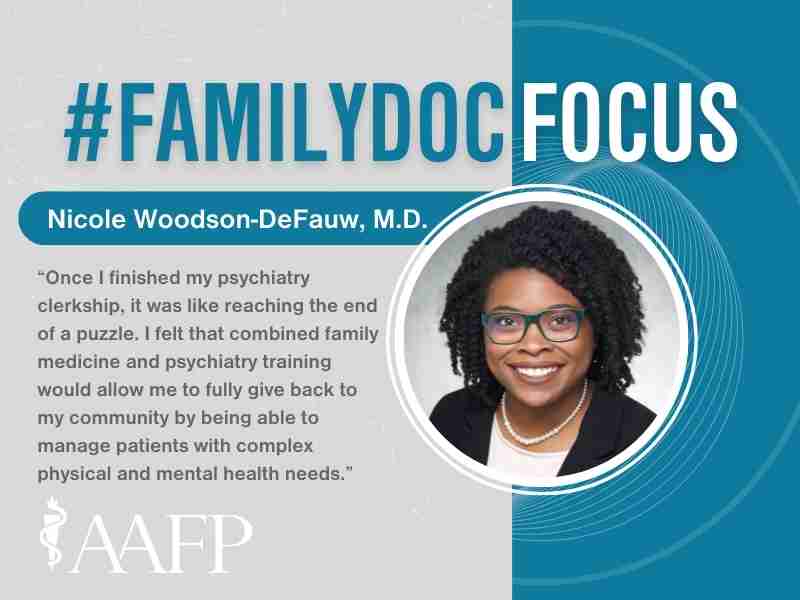Brother’s Death Pushes GME Award Winner to Help Others
September 6, 2022, 1:40 p.m. David Mitchell — Nicole Woodson-DeFauw, M.D., was just 9 years old when her older brother died of pneumonia. More than 20 years later, her experience still influences how she interacts with her own patients.

“We were back and forth to the hospital maybe three or four times,” she said. “And that last time he just never came home.”
Javell Woodson was just 20 years old. The family believes his care may have been complicated by his mental health diagnosis.
“We felt like they weren’t hearing him and were just continuing to send him home,” Woodson-DeFauw said. “Patients with a mental health diagnosis can often be stigmatized. I think that stigma could have been a part of why he wasn’t heard and why he’s not here today. His story pushes me to listen to my patients, especially patients who have experienced stigma, and to treat my patients as a whole and validate them.”
Woodson-DeFauw, and those around her, knew early on that she was destined for a career in medicine. Her pastor started referring to her as “Doctor” long before she was accepted to medical school.
“I was one of those weird kids who loved going to the doctor,” she said, “and I had a great primary care physician. I often saw myself in her shoes.”
After college graduation, she shadowed family physicians in her hometown of Davenport, Iowa, an experience that cemented her interest in primary care.
Woodson-DeFauw was drawn to family medicine, in part, by its broad scope of practice. But her interests expanded even further during a psychiatry clerkship at an inpatient mental health facility during her third year at Meharry Medical College in Nashville, Tenn.
“The attending I worked with asked, ‘Do you want to see your own patients?’” she said. “He gave me a lot of autonomy and would challenge me. It was fulfilling.”
Particularly when her patients got better.
“When I started my rotation, patients were acutely manic, psychotic or in crisis,” she said. “Seeing them improve over their hospital stay was really rewarding, and I felt like patients were very appreciative of having someone who would listen to them and advocate for them. My attending watered my little seed of interest, and it grew really big.”
Woodson-DeFauw started medical school knowing she was going to be a family physician because she loved the family doctors she had spent time with and wanted to provide that same broad spectrum of care for patients from birth to end of life. Her psychiatry clerkship pushed her to do more.
“Once I finished my psychiatry clerkship, it was like reaching the end of a puzzle,” said Woodson-DeFauw, former chief resident in the combined family medicine and psychiatry program at the University of Iowa. “I felt that combined family medicine and psychiatry training would allow me to fully give back to my community by being able to manage patients with complex physical and mental health needs.”
Woodson-DeFauw will complete her residency training next summer and she plans to stay at the University of Iowa to complete an addiction medicine fellowship. She already has used a related grant from the American Psychiatric Association and the Substance Abuse and Mental Health Services Administration to create a mentorship program for underrepresented medical students interested in mental health. She also created a grand round series for mental health equity that featured national and local mental health experts last year and again this year. She said the lectures drew large audiences across multiple specialties “because everybody cares for patients with mental health diagnosis.”
As a resident, she has taken particular professional interests in compassionate and patient-centered care for patients experiencing addiction and substance use disorders. She has advocated for strong national family medicine curricular guidelines through her participation in the revision of the National Family Medicine Curriculum Guideline for Substance Use Disorders. She also participated in the Chief Resident Immersion Training Program in Addiction Medicine.
During the COVID-19 pandemic she provided community sessions on medical literacy and advocacy in local high schools and led local discussions of the pandemic’s impact on the Black community.
For her efforts, Woodson-DeFauw has been named as one of 12 recipients of the AAFP’s Award for Excellence in Graduate Medical Education. In addition to the recognition, recipients receive a $1,000 scholarship, hotel accommodations, airfare and registration for the Sept. 20-23 Family Medicine Experience in Washington, D.C., which is still open for registration.
Woodson-DeFauw said she’s interested in continuing to mentor and care for underserved people after the fellowship ends, perhaps at a federally qualified health center. As a medical student, she worked in a free mental health clinic at Meharry, which emphasizes service to its community.
“We were the only safety net hospital in Nashville, so that’s where uninsured patients went,” she said. “It’s in the middle of a neighborhood that had significant medical needs and decreased access to care. It was eye-opening. Our patients were appreciative of us being there. That’s where my passion for giving back and taking care of the underserved began, and why I believe it is important to this day.”